- Partnership with UW-Extension expands outreach
- Center spells success for regional manufacturers
- Conferences introduce technologies to people with disabilities
- Research enterprise expands
- Sabbaticals promote faculty excellence
- Series presents innovative processes
- New center offers food packaging expertise
- Local farms benefit from byproduct research
- Team studies environmentally friendly bacteria
- First international scholarship
Goal 3:
Promote excellence in teaching, research, scholarship and service
Partnership with
UW-Extension expands outreach
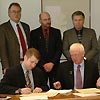 UW-Stout's
Center for Innovation and Development partnered with UW-Extension's statewide
Small Business Development Center network to provide a wider range of
business development services to regional entrepreneurs. The partnership
is critical during the state's fiscal crisis, providing a method for economic
recovery by cultivating a positive climate for new products and technologies.
UW-Stout's
Center for Innovation and Development partnered with UW-Extension's statewide
Small Business Development Center network to provide a wider range of
business development services to regional entrepreneurs. The partnership
is critical during the state's fiscal crisis, providing a method for economic
recovery by cultivating a positive climate for new products and technologies.
SBDC counselors work with a wide variety of entrepreneurs to develop sound business plans, obtain financing and acquire basic management skills. The SBDC specialty center at UW-Whitewater expands these services to new product and invention assessments and market expansion feasibility studies. UW-Stout's CID provides the next step — actual product engineering and design, prototype development and product evaluation.
Center spells success
for regional manufacturers
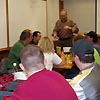 UW-Stout's
Northwest Wisconsin Manufacturing Outreach Center promotes the competitiveness,
strength, productivity, growth and innovative capabilities of more than
2,000 small- to medium-sized manufacturers in Northwest Wisconsin. NWMOC
is a direct partnership between UW-Stout and the following five technical
colleges: Chippewa Valley, Nicolet Area, Northcentral, Western Wisconsin
and Wisconsin Indianhead.
UW-Stout's
Northwest Wisconsin Manufacturing Outreach Center promotes the competitiveness,
strength, productivity, growth and innovative capabilities of more than
2,000 small- to medium-sized manufacturers in Northwest Wisconsin. NWMOC
is a direct partnership between UW-Stout and the following five technical
colleges: Chippewa Valley, Nicolet Area, Northcentral, Western Wisconsin
and Wisconsin Indianhead.
As a nonprofit center within the Stout Technology Transfer Institute, NWMOC meets a wide range of business needs through the expertise of its staff; access to instructors at UW-Stout and the technical colleges; and the resources of a consultant network. This range of expertise helps manufacturers apply modern tools and strategies in order to:
- reduce lead-time.
- cut inventory.
- improve cash flow.
- boost productivity.
- improve product quality.
- increase bottom line profitability.
Since it was formed, NWMOC has provided approximately 2,700 technical assistance activities to more than 900 companies; sponsored 296 educational events for 3,280 people from 2,012 companies; helped to create or retain 1,807 jobs; and achieved client-reported impacts of more than $110 million.
For example, the center recently connected Phillips Plastics Corporation to university expertise that saved the company approximately $150,000 in lost revenue from shipping damage. An instructor and a student from UW-Stout's packaging program conducted research and introduced a packaging material to the company that reduces shipping damage to an insulin pen case. The new material also cost less, was less harmful to the environment and required less packing labor.
Conferences introduce technologies to people with disabilities
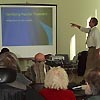 A
series of conferences organized by the Stout Vocational Rehabilitation
Institute introduced new quality-of-life enhancing technologies to more
than 900 persons with disabilities from across the state. In conjunction
with the Division of Vocational Rehabilitation and the Wisconsin Independent
Living Centers, SVRI conducted 10 assistive technology conferences.
A
series of conferences organized by the Stout Vocational Rehabilitation
Institute introduced new quality-of-life enhancing technologies to more
than 900 persons with disabilities from across the state. In conjunction
with the Division of Vocational Rehabilitation and the Wisconsin Independent
Living Centers, SVRI conducted 10 assistive technology conferences.
Individuals with disabilities attended a variety of conference sessions created to enable them to boost their abilities, including:
- adapting transportation.
- accessing computer technology.
- working from home.
- getting assessed for assistive technology.
- requesting job accommodations.
- finding funding resources.
- accommodating chronic pain.
SVRI staff and service providers from around Wisconsin provided the presentations. Vendors of assistive technology, ranging from accessible van rental to computer adaptation services, also set up demonstration tables at the conferences.
The DVR funded conferences in La Crosse, Hayward, Milwaukee, Madison, West Bend, Eau Claire, Wausau and Green Bay. The Great Lakes Inter-Tribal Council and Lac Courte Oreilles Band of Lake Superior Chippewa funded two of the conferences, held on the Lac Courte Oreilles and Lac du Flambeau reservations, with gaming revenue.
Research enterprise expands
UW-Stout strongly encourages faculty and staff to conduct research and scholarly activities related to the university's academic programs. As a result, the research enterprise at UW-Stout continues to remain strong.
- The number of faculty and academic staff involved in research and scholarly activities rose to 40 percent.
- The success rate of submitted proposals is very high -- 75 percent are funded as compared to the national average of 10 percent.
- During the 2001-02 fiscal year, 227 proposals were submitted totaling $20,253,719. Funding totaling $5,322,496 was awarded for 204 of those proposals -- a significant increase from 172 awarded in 2000-01. (Figure 1)
- The number of proposals faculty submitted to the National Science Foundation increased to 15, a significant boost from one NSF proposal five years ago.
- Student involvement in the research process is growing, including participation in the Journal of Student Research and the statewide Undergraduate Council of Student Research Conference.
- Collaborative research between academic departments continues to grow. For example, a food and nutrition instructor and a biology instructor are working together on a project related to silicon and collagen production.
- Research partnerships continue to grow with other universities, such as Ohio State University, University of Tennessee-Knoxville, University of Illinois Champaign-Urbana and Minnesota State College System-Century College. For example, a UW-Stout technology education instructor is working on a National Science Foundation-funded curriculum development project with instructors from five other universities under the leadership of Ohio State University.
- International research partnerships are also growing. For example, a technology department instructor is working on a materials science project with a researcher from Krakow, Poland, funded by the National Academy of Sciences COBASE program.
- Addressing UW-Stout's goal to offer international experiences, a rehabilitation and counseling instructor secured funding to build rehabilitation program and study abroad opportunities in New Zealand. As a part of this initiative, 15 students with disabilities studied in New Zealand.
- The Stout Vocational Rehabilitation Institute, basic to the fiber of research at UW-Stout, worked on numerous projects that focused on issues related to employing people with disabilities.
- New grant awards provide faculty with release time from summer session or one semester to develop a major proposal to an external funding agency.
- Money has been identified to support noninstructional laboratories and facilities to meet UW-Stout's applied research priority.
- The Faculty Research Associate program, now in its third year, brings faculty into the research office each summer to assist others in proposal development.
- The second year of the monthly Research Seminar Series featured campus researchers and their projects, including those nominated for the Outstanding Researcher Award and the Faculty Research Associate.
Sabbaticals promote faculty excellence
Ten UW-Stout faculty members were awarded sabbaticals during the 2002-03 academic year to enhance their teaching and research efforts. (Figure 2)
Faculty on leave for one semester:
- investigated the use of laptop computers in teacher education courses and developed a summer retreat for K-12 and vocational educators.
- participated in culturally diverse experiences designed to enhance understanding about diverse children and families.
- completed the manuscript and artwork for an interior design book, completed the proposal for a new book and continued related research.
- focused on the child guidance concept of Developmentally Appropriate Practice in early childhood.
- visited India to study the culture, religion and crafts of cottage industries.
- studied advanced design techniques and technologies, and investigated the integration of CAD, rapid prototyping and investment casting.
- increased knowledge of indigenous cultural practices and beliefs as they relate to family life, gender roles, sexuality, spirituality, health and healing.
Faculty awarded full academic year sabbaticals:
- worked with the Casualty Actuarial Society and other practicing actuaries to better advise future UW-Stout students.
- trained in the laboratories of a University of Indiana-Bloomington professor to learn additional skills in experimental design, the use of psycho-physiological equipment, and the writing and publishing of scientific papers.
- studied and documented examples of postmodern, high-tech and deconstructive architecture in the United States and Europe.
Series presents innovative processes
A series of monthly presentations, Tech-talk Business Briefs, introduced regional employers to the campus and the area community. Sponsored by Stout Solutions and the Stout Technology Park, the hour-long presentations by business leaders encouraged discussions about innovations in business and industry, regional technical support needs, and research and training opportunities.
Workforce development, technical assistance and training providers; business owners and supporters; city and county officials; and chamber of commerce and economic development professionals were encouraged to attend the free talks. During the spring semester, Tech-talk Business Briefs covered a wide range of topics.
- CRI Recycling Service presented a patent pending extraction process to recycle oil and absorbent materials without damaging the ozone.
- Wisconsin Manufacturers and Commerce, the state's largest and most influential business and industrial organization, talked about business in Wisconsin.
- TNT Logistics discussed supply chain excellence through industry-leading execution and technology.
- Marshfield Clinic Menomonie Center discussed the Regional Early Childhood Immunization Network.
New center offers food packaging expertise
UW-Stout launched the Food Packaging and Technology Center to assist businesses in the four-state region with all aspects of food product development and food packaging. The FPTC is a research and development, training and consulting center that offers the food industry the following services:
- Improving profitability
- Developing new products, processes or packaging
- Expanding market windows
- Assessing or improving technical skills
- Obtaining funding through grants to solve industrial problems
The FPTC combines the expertise of students and instructors in UW-Stout's art, food systems and technology, dietetics and nutrition programs. As part of the Stout Technology Transfer Institute, the FPTC will generate projects and revenue that offer the following benefits to UW-Stout:
- Enhanced outreach efforts, strengthening the food science and packaging professions, and raising the awareness of UW-Stout's unique programs
- Support for graduate assistantships
- Additional resources to maintain and upgrade laboratories
- Current industry projects to use as classroom teaching examples, increasing student understanding
The center has already worked on projects with such regional companies as Appleton Inc. and Northstar Bison, and has agreed to work with several new companies during the next year.
Local farms benefit from byproduct research
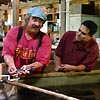 A
UW-Stout researcher from the food and nutrition department helped the
local Bullfrog Fish Farm transform its byproducts into high-quality fish
feed. Finding a way to benefit from the nutritional value of approximately
10,000 pounds of fish processing byproducts was essential to the farm's
plans for future growth.
A
UW-Stout researcher from the food and nutrition department helped the
local Bullfrog Fish Farm transform its byproducts into high-quality fish
feed. Finding a way to benefit from the nutritional value of approximately
10,000 pounds of fish processing byproducts was essential to the farm's
plans for future growth.
The UW-Stout researcher developed a process to use Bullfrog Fish Farm's fish processing byproducts to manufacture high-quality fish meal, a primary ingredient in trout feed, right on the farm. This new process converted the farm's largest waste of resources into a significant reduction of purchased feed, its second largest production cost. The solution addressed a number of other issues, such as nutrition, cost, disease, water quality, labor and storage.
The researcher and students also worked with Cady Cheese Factory to find ways the business can benefit from whey produced by its cheese production process. The researchers worked to develop potential food products that take advantage of the whey's high mineral content, including a sports beverage, beer and snack food.
Team studies environmentally friendly bacteria
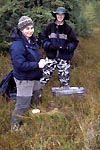 A
UW-Stout research team made up of a biology instructor, a post-doctorate
teaching scholar and several students, studied peat bog bacteria that
slow global warming by eating methane, a potent greenhouse gas.
A
UW-Stout research team made up of a biology instructor, a post-doctorate
teaching scholar and several students, studied peat bog bacteria that
slow global warming by eating methane, a potent greenhouse gas.
The bacteria studied by the team convert methane into carbon dioxide, a greenhouse gas that is much less potent, but still important in global warming. The team hopes that a better understanding of this process may someday lead to the control of methane production.
Supported by a National Science Foundation CAREER grant, the research team is currently developing new ways to identify the methane-eating bacteria. To do this, they conduct field research in peat bogs in Bena, Minn., and in the Trout Lake Station in Wisconsin's Vilas County. Up to their knees in water and peat, they study the bacteria's habitat and take core samples that they later analyze in the laboratory.
The researchers are comparing the core samples taken from the two different sites, which are strikingly different. The peat bog in Minnesota is nutrient poor and contains very few plant species, while the Wisconsin site provides more nutrients and is home to a much larger variety of plants.
First international scholarship
broadens scope of program
As the result of collaboration between UW-Stout, Marshall Erdman & Associates, and Vilnius Gediminas Technical University, a student from Lithuania attended a semester of courses in UW-Stout's construction program. The VGTU student also participated in an eight-month cooperative education experience with ME&A through UW-Stout's Placement and Co-op Services Office.
ME&A provided $24,000 to cover the Lithuanian student's expenses. Approximately 50 percent of the funds formed a scholarship through the Stout University Foundation. The remainder covered the student's wages and living expenses during the co-op experience.
UW-Stout will use the study abroad agreement it developed with VGTU as a model contract for all future partnerships with international universities, including a possible business administration exchange with VGTU.
